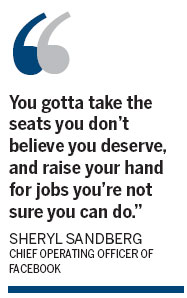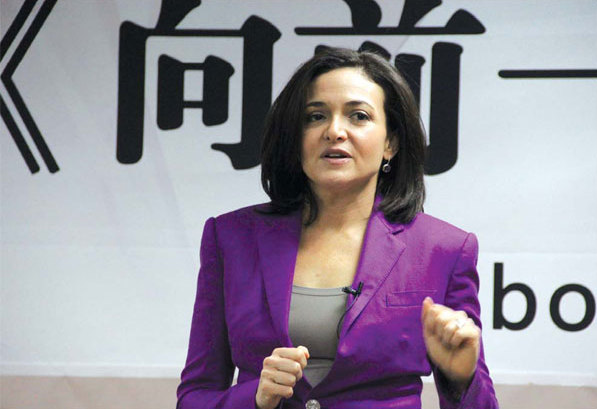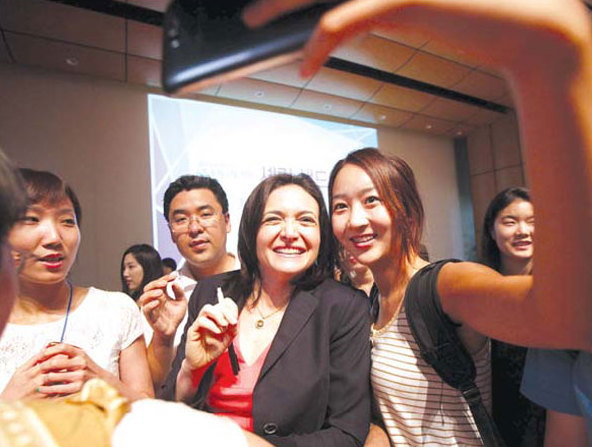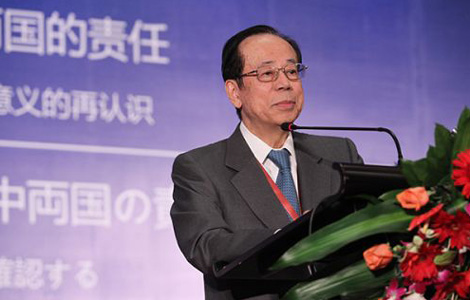Women, lean in
Updated: 2013-10-29 07:27
By Mei Jia (China Daily)
|
|||||||||||
Sheryl Sandberg, Facebook's chief operating officer, was in China to promote her new book on feminism. Mei Jia finds about her new mission.
When Sheryl Sandberg, Facebook's chief operating officer, visited China to promote her new book Lean In, she already had a large number of fans in the country. People were drawn to Sandberg either by her story of success, or the notion of the renewed feminist movement inspired by her book.
Her personal glamour is not confined to a pretty face, elegant behavior, smart talk, perfect CV and a happy marriage, all of which laid wonderful foundation for her book to be a best-seller as Kong Yan, editor with her Chinese publisher, points out. Her persona seems to radiate from deep inside.
The moment Sandberg finished a session with Chinese media upon her visit, she walked directly to a reporter who had asked a question about her own hard decisions between work and marriage, Sandberg held the reporter's hand and said, "You'll be all right".
|
Sheryl Sandberg hopes her book can start to change the stereotypes and assumptions of women. Mei Jia / China Daily |
|
Sheryl Sandberg posed with students for photographs after her speech at Yonsei University in Seoul, South Korea, on July 3, 2013. Woohae Cho / Bloomberg via Getty Images |
Sandberg knows these kinds of struggles well. And she also notices that while professional women feel guilty for choosing work over family, their male peers will probably not.
"I wrote Lean In because despite the fact that women have made a lot of progress, nowhere in the world are women close to half of the positions of leaders as men," she says.
She is also worried about the scenario when women begin to feel content with the current progress, and "they stop being feminists".
As COO of a technology-based firm, Sandberg quotes data with ease.
She says across the world only 16 governments are run by women, while 95 percent of global companies are run by men. In the United States, women make up 18 percent of seats in the congress, and 14 percent of the top jobs in the corporations. While in China, women constitute 4.5 percent of top CEO jobs in 1997, and about 5 percent today, she quotes.
It was her TED talk in 2010, titled Why We Have Too Few Women Leaders, that planted the idea in Sandberg's mind to work for gender equality.
The 44-year-old Harvard graduate told the Beijing audience she's a feminist.
But she says five years ago she would not have labelled herself a feminist, because it's a hard word, and understanding of its meaning is required.
"I think I'm late," she says. "I should have spoken out on the issue earlier."

The oldest daughter of a Jewish doctor and French professor, Sandberg worked as assistant to Larry Summers, her mentor and thesis adviser in college, at the World Bank after graduation. She continued to serve as chief of staff for Summers when he became United States Secretary of the Treasury.
She moved on to work as the vice-president of Google before working with Mark Zuckerberg at Facebook.
At Facebook, she increased revenue by eight times in three years. And in 2012, she became the first woman to serve on the company's board of directors.
Sandberg notes that throughout her career most of her bosses have been men.
"I'm very clear that I have many resources, like growing up with a family that gave me a great education, but the point of Lean In is not for you to have other's life or my life. The point is equality," she says.
In her book she records anecdotes about herself and other businesswomen like her.
She shares her experience negotiating on behalf of Facebook at the office in New York. When she asked to use the toilet during a break, her partner was stunned because "no woman had been there and has ever asked about using the lady's restroom".
She was also instrumental in asking for a reserved parking lot for pregnant employees at Google.
"Despite the different culture, everywhere in the world has similar stereotype for man and woman.
"Men are told to be professionals and fathers, they don't have to make hard choices. But women have to make choices.
"I want women to have the same choices. I hope my book can be a beginning in changing the stereotypes and assumptions," she says.
In her book, Sandberg says the secret to break the stereotypes of men being aggressive, and women being nice, friendly, speaking when spoken to, putting their hands down and sitting on the side not the center, is to "lean in" and to feel comfortable about the fact that a woman can't be an almighty being that deals perfectly with everything she touches.
"To this day, I spent years researching a book telling everyone to feel more comfortable, I'm still having these issues," she admits.
"We are human, I let myself be upset. Cry out if I need to. Just make decisions and be happy with that," she says.
Another important message in her book is that "women cannot do all of the work themselves".
An advocator of splitting housework and childcare, Sandberg shares how she and her husband David Goldberg maintain a happy marriage and their two children.
"We both work full time and deal with our children.
"My husband thinks he's a hero," she says, with humor and wit as she does in her book.
Sandberg believes splitting chores will reward husbands with a happier marriage.
She says in a competitive world, if men have better knowledge of women and be a better manager of women, they will have more chances of success.
Her fundamental advice to women is "you gotta take the seats you don't believe you deserve, and raise your hand for jobs you're not sure you can do", while her advice to men is "don't buy flowers, do laundry".
Contact the writer at meijia@chinadaily.com.cn.
(China Daily 10/29/2013 page22)
Today's Top News
Storm wrecks havoc in S Britain, leaving 4 dead
'Prime time' for Chinese firms to invest in EU
China providing space training
Antiquated ideas source of Abe strategy
Women's congress aims to close gap
Accident in Tian'anmen kills 5
Media giant comes of age
Miscommunication source of conflicts
Hot Topics
Lunar probe , China growth forecasts, Emission rules get tougher, China seen through 'colored lens', International board,
Editor's Picks

|

|

|

|

|

|







